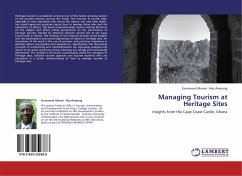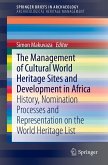Heritage tourism is considered as being one of the fastest growing sectors of the tourism industry around the world. The increase in tourist visits, especially at sites associated with events like slavery, war and mass death, has raised important questions about how to manage these sites and the experience of visitors. This book comprehensively reviews existing literature on the subject and offers critical perspectives on the phenomena of heritage tourism, backed by empirical research carried out at the Cape Coast Castle in Ghana. The findings of this research provide useful insights into the expectations and actual experiences of visitors to heritage sites. An innovation of the work is the use of pre-tour and post-tour interviews in eliciting visitors' perceptions and experiences. Significantly, the theoretical concepts of authenticity and commodification are vigorously analysed and shown to be social constructs whose meanings are socially and contextually determined. The analysis in this book is particularly useful for managers of heritage sites, national tourism agencies and tourism students who are interested in a better understanding of how to manage tourism at heritage sites.
Bitte wählen Sie Ihr Anliegen aus.
Rechnungen
Retourenschein anfordern
Bestellstatus
Storno








